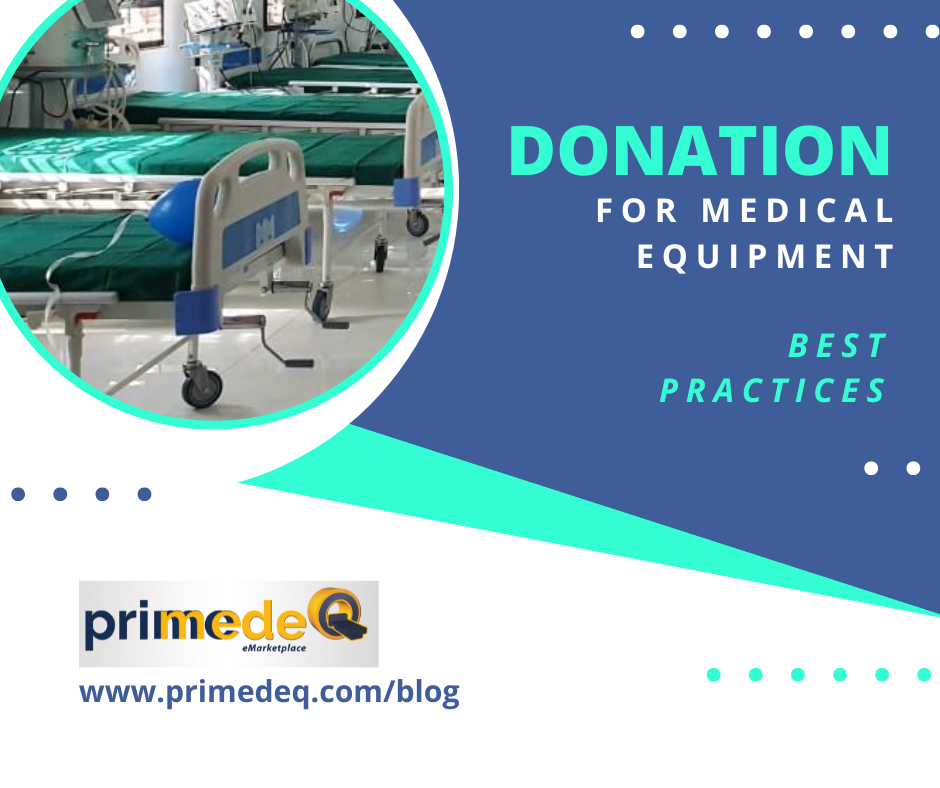
Best Practices for Medical Equipment Donation
Are you looking to make a donation for medical equipment? Are you considering a CSR project in healthcare? There is no dearth of people looking for ways to improve access to better healthcare of under served population. However, just as in any charitable causes, often, the main concern that remains is the proper utilization of funds donated and even more importantly the actual impact on the intended beneficiaries.
As implementation partners of many CSR projects and non-profit organisations in healthcare, we have sometimes seen resources wasted, underutilized or even misspent. Here are a few points to consider when making a donation for medical equipment purchase in social impact ventures in healthcare.
1. Due-diligence with end user
When donating medical equipment or funds for medical equipment, take care to do a proper due diligence. It is not enough to just know what equipment the user needs. The due diligence should ideally include the following information:
- Current equipment capacity and its average utilization across a period, if any
- Availability of medical, nursing and paramedical staff, qualified to use and handle the equipment
- Availability of space to house the equipment and other infrastructure required (such as medical gas pipeline infra if ICU beds are being donated)
- Expected outcomes and impact in the region due to the proposed equipment.
- Capacity and willingness to share reports on outcome in future
No hospital will refuse donation for medical equipment. However, sometimes discussions happen at senior management levels and specific inputs at the user level may not be taken. It is often seen that equipment are not utilized because it does not match the actual need or the staff does not have the right training to use and hence has no confidence in handling critical equipment. As a result, needy patients are diverted to other facilities far-off and the equipment lies underutilized.
It is also observed that while staff and equipment are available, proper infrastructure is either not sanctioned or there is inadequate space in the facility to accommodate the same. Consequently the equipment does not even get installed.
Therefore, to ensure good utilization of the funds donated, proper due diligence along the above lines must be done. Lastly, the hospital accepting donation must understand that the donor would like to know the impact they are making by their donation. They must regularly share data on number of patients benefiting from the donation and details of positive impact on the society in the following years.
Customize to end-user requirement
In some projects aiming to make big impact, standard set of medical equipment are approved for donation. This may also be so as to get best negotiated deals from medical equipment vendors. However, this means that there is a mismatch between the equipment being donated and that preferred by the end-user. Sometimes, quantity takes precedence over quality just to show bigger numbers. Our experience has been that, even if it is fewer in number, it is always better to donate good quality equipment that the end-user will actually use.
2. Monitor usage & maintenance
The donor’s job is not over after equipment installation and handover. It is important to ensure proper maintenance and monitor usage at least for a period of one year if not more. It is a best practice to purchase the equipment along with 1-3 years warranty. This simple practice will ensure consistent availability and utilization of donated equipment and hence result in desired impact.
3. Periodic inventory & Retrieval rights in MOU
During the short-term of 2-3 years while overseeing preventive maintenance of the equipment, also ensure periodic inventory is taken. It is often noted that the hospital staff moves the equipment from one unit to another at their will resulting in the equipment not being available for the welfare of the patients for whom the donation was intended. Soon the equipment may go untraceable too. In certain cases, it has been observed that the equipment may have been moved out of the charitable / Government hospital to which it was donated and being used in some private settings.
To avoid any such occurrences, it is a best to ensure periodic inventory. The donor may also consider entering into an MOU with the donee and incorporate a right of retrieval, in the event of underutilization of the equipment.
4. Ideal implementation partner to handle donation for medical equipment
Understandably, a donor or an NGO may not have the right resources or skills to carry out all necessary activities mentioned above. The necessary steps starting from due-diligence, evaluation and purchase of equipment for best price, periodic maintenance, inventory taking and also gathering utilization & impact data, requires professional assistance. So it is important to engage an effective implementation partner.
An ideal implementation partner in this area should,
- Know due-diligence process
- have knowledge of all types of medical equipment – to assist in evaluation and procurement
- have extensive network across India (of vendor partners and medical equipment technicians) – to install and maintain in all possible locations
- have experience / track record of carrying out such social projects to anticipate challenges and still deliver in a timely, reliable manner.
If you are looking for a medical equipment implementation partner for a social impact project through CSR or other sources of funding anywhere in India, please contact PrimedeQ India @ 7019759765 / 8971223957 or [email protected]
—————————————————————————————————————————
PrimedeQ is an e-Marketplace for buying, selling, renting, servicing and spares of medical equipment. We offer all types of used / refurbished medical equipment , including cathlab, ECG machine and other diagnostic equipment, endoscopes, OT equipment, Laparoscopic Equipment, Lab equipment, X-Ray, TMT, anesthesia machine, ultrasound machines etc including physiotherapy and rehabilitation equipment (New & Used). We offer repair services for all types of medical equipment.
Contact us for any medical equipment requirements on 7019759765.
https://in.linkedin.com/in/shanthi-mathur-ab07838
